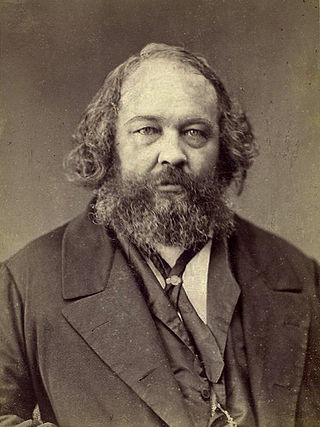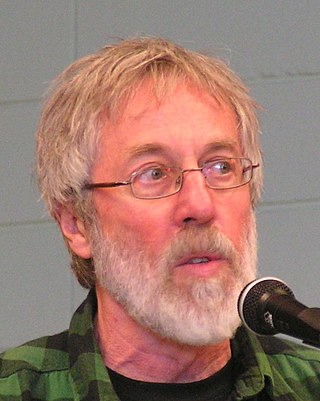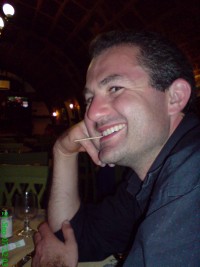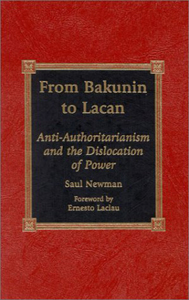Content
Philosophy professor Todd May asserts that the overall purpose of the book is "to offer a critique of the way power, and specifically political power, is commonly conceived". [2] Newman persistently questions how anarchism can refrain from reproducing the forms of oppression that it strives to overcome. [3]
Newman incorporates concepts from post-structuralist thought such as post-humanism and anti-essentialism into classical anarchism. Unlike May, whose post-anarchism is a combination of the two, Newman attempts to move beyond both anarchism and post-structuralism. [4] He proposes that "by using the poststructuralist critique one can theorize the possibility of political resistance without essentialist guarantees: a politics of postanarchism … by incorporating the moral principles of anarchism with the postructuralist critique of essentialism, it may be possible to arrive at an ethically workable, politically valid, and genuinely democratic notion of resistance to domination". [5]
Newman focuses particularly on the work of Gilles Deleuze, Jacques Derrida, and psychoanalyst Jacques Lacan. [3]
Reception
Aimed at an academic rather than anarchist audience, the book was criticised in Anarchy: A Journal of Desire Armed for its unsophisticated, cursory understanding of and engagement with anarchist theory. [4] While praising that section of the book on post-structuralist philosophers, reviewer sasha k claimed that "Newman uses Kropotkin and Bakunin as his stand-ins for anarchism in general, and, in turn, only a few quotes from each to make his case". [4] He questioned whether Newman's attribution of an essentialist conception of human nature to modern anarchists was accurate, concluding that, had the book taken "a less one-dimensional view of anarchism", it would have to give up "most of what makes postanarchism post-anarchism. [4]
New Formulation reviewer Michael Glavin cited Newman's ignorance of the initiative of anarchists to decentralize power and of anarchist forms of organisation such as trade unions, federations and affinity groups as evidence that he failed to understand power and wrongly conflated it with domination. [3]
Anarchism is a political philosophy and movement that is skeptical of all justifications for authority and seeks to abolish the institutions it claims maintain unnecessary coercion and hierarchy, typically including nation-states, and capitalism. Anarchism advocates for the replacement of the state with stateless societies and voluntary free associations. As a historically left-wing movement, this reading of anarchism is placed on the farthest left of the political spectrum, usually described as the libertarian wing of the socialist movement.

Mikhail Alexandrovich Bakunin was a Russian revolutionary anarchist. He is among the most influential figures of anarchism and a major figure in the revolutionary socialist, social anarchist, and collectivist anarchist traditions. Bakunin's prestige as a revolutionary also made him one of the most famous ideologues in Europe, gaining substantial influence among radicals throughout Russia and Europe.
Anarcho-primitivism, also known as anti-civilization anarchism, is an anarchist critique of civilization that advocates a return to non-civilized ways of life through deindustrialization, abolition of the division of labor or specialization, abandonment of large-scale organization and all technology other than prehistoric technology and the dissolution of agriculture. Anarcho-primitivists critique the origins and alleged progress of the Industrial Revolution and industrial society. According to anarcho-primitivists, the shift from hunter-gatherer to agricultural subsistence during the Neolithic Revolution gave rise to coercion, social alienation, and social stratification.
Green anarchism, also known as ecological anarchism or eco-anarchism, is an anarchist school of thought that focuses on ecology and environmental issues. It is an anti-capitalist and anti-authoritarian form of radical environmentalism, which emphasises social organization, freedom and self-fulfillment.

John Edward Zerzan is an American anarchist and primitivist author. His works criticize agricultural civilization as inherently oppressive, and advocates drawing upon the ways of life of hunter-gatherers as an inspiration for what a free society should look like. Subjects of his criticism include domestication and symbolic thought.
The history of anarchism is ambiguous, primarily due to the ambiguity of anarchism itself. Scholars find it hard to define or agree on what anarchism means, which makes outlining its history difficult. There is a range of views on anarchism and its history. Some feel anarchism is a distinct, well-defined 19th and 20th century movement while others identify anarchist traits long before first civilisations existed.
Anarchists have traditionally been skeptical of or vehemently opposed to organized religion. Nevertheless, some anarchists have provided religious interpretations and approaches to anarchism, including the idea that the glorification of the state is a form of sinful idolatry.

Saul Newman is a British political theorist who writes on post-anarchism. He is professor of political theory at Goldsmiths College, University of London.
Anarchism is generally defined as the political philosophy which holds the state to be undesirable, unnecessary and harmful as well as opposing authority and hierarchical organization in the conduct of human relations. Proponents of anarchism, known as anarchists, advocate stateless societies based on non-hierarchical voluntary associations. While anarchism holds the state to be undesirable, unnecessary and harmful, opposition to the state is not its central or sole definition. Anarchism can entail opposing authority or hierarchy in the conduct of all human relations.
The following outline is provided as an overview of and topical guide to anarchism:
Lewis Call is an American academic and central post-anarchist thinker. He is best known for his 2002 book Postmodern Anarchism, which develops an account of postmodern anarchism through philosophers such as Friedrich Nietzsche and cyberpunk writers such as William Gibson and Bruce Sterling. Call has written extensively on the intersection of post-anarchism and science fiction, covering philosophers and authors such as Gilles Deleuze, Jean Baudrillard, Octavia Butler, Samuel R. Delany and Ursula K. Le Guin.
Contemporary anarchism within the history of anarchism is the period of the anarchist movement continuing from the end of World War II and into the present. Since the last third of the 20th century, anarchists have been involved in anti-globalisation, peace, squatter and student protest movements. Anarchists have participated in armed revolutions such as in those that created the Makhnovshchina and Revolutionary Catalonia, and anarchist political organizations such as the International Workers' Association and the Industrial Workers of the World have existed since the 20th century. Within contemporary anarchism, the anti-capitalism of classical anarchism has remained prominent.
Anarchism: A Documentary History of Libertarian Ideas is a three-volume anthology of anarchist writings edited by historian Robert Graham. The anthology is published by Black Rose Books. Each selection is introduced by Graham, placing each author and selection in their historical and ideological context. The focus of the anthology is on the origins and development of anarchist ideas; it is not a documentary history of the world's anarchist movements, although the selections are geographically diverse.
The relation between anarchism and Friedrich Nietzsche has been ambiguous. Even though Nietzsche criticized anarchists, his thought proved influential for many of them. As such "[t]here were many things that drew anarchists to Nietzsche: his hatred of the state; his disgust for the mindless social behavior of 'herds'; his anti-Christianity; his distrust of the effect of both the market and the State on cultural production; his desire for an 'übermensch'—that is, for a new human who was to be neither master nor slave".
This is a list of articles in continental philosophy.
Social anarchism, also known as left-wing anarchism or socialist anarchism, is the branch of anarchism that sees liberty and social equality as interrelated.
Collectivist anarchism, also called anarchist collectivism and anarcho-collectivism, is an anarchist school of thought that advocates the abolition of both the state and private ownership of the means of production. In their place, it envisions both the collective ownership of the means of production and the entitlement of workers to the fruits of their own labour, which would be ensured by a societal pact between individuals and collectives. Collectivists considered trade unions to be the means through which to bring about collectivism through a social revolution, where they would form the nucleus for a post-capitalist society.
Anarchism and libertarianism, as broad political ideologies with manifold historical and contemporary meanings, have contested definitions. Their adherents have a pluralistic and overlapping tradition that makes precise definition of the political ideology difficult or impossible, compounded by a lack of common features, differing priorities of subgroups, lack of academic acceptance, and contentious historical usage.
This is a list of works by Murray Bookchin (1921–2006). For a more complete list, please see the Bookchin bibliography compiled by Janet Biehl.

Anarchist criminology is a school of thought in criminology that draws on influences and insights from anarchist theory and practice. Building on insights from anarchist theorists including Pierre-Joseph Proudhon and Peter Kropotkin, anarchist criminologists' approach to the causes of crime emphasises what they argue are the harmful effects of the state. Anarchist criminologists, a number of whom have produced work in the field since the 1970s, have critiqued the political underpinnings of criminology and emphasised the political significance of forms of crime not ordinarily considered to be political. Anarchists propose the abolition of the state; accordingly, anarchist criminologists tend to argue in favour of forms of non-state justice. The principles and arguments of anarchist criminology share certain features with those of Marxist criminology, critical criminology and other schools of thought within the discipline, while also differing in certain respects.




